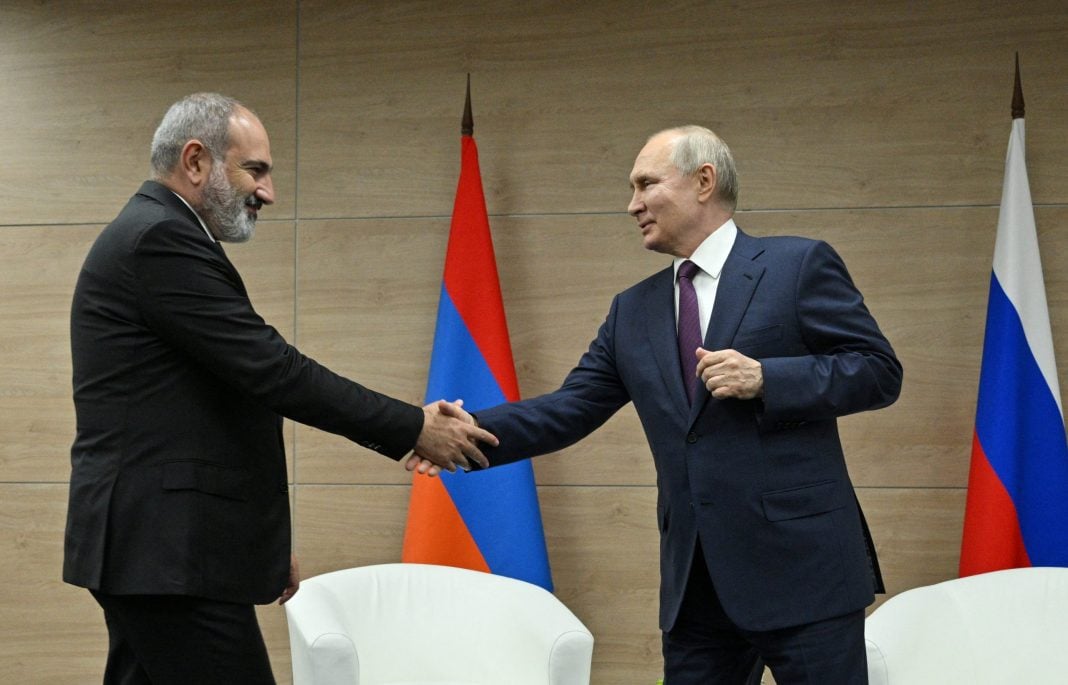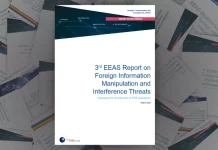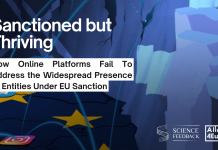By Ani Mejlumyan, Roman Osadchuk, for DFRLab
Pro-Russian actors are spreading false and misleading narratives that draw negative parallels between Ukrainian President Volodymyr Zelenskyy and Armenian Prime Minister Nikol Pashinyan. The narratives coincide with recent statements from the Armenian government distancing itself from Russia. The framing at times exploits Armenians’ grievances in Nagorno-Karabakh to fuel anti-Ukrainian sentiment.
Pro-Russia actors regularly share anti-Ukraine narratives in Armenia. However, Armenia has recently been more open with its criticism of Moscow and the Russia-led Collective Security Treaty Organization (CSTO). As the Armenian government distances itself from Russia, it is increasingly being targeted with narratives that suggest parallels between it and Ukraine. On May 16, 2023, Armenian Deputy Foreign Minister Mnatsakan Safaryan said that Armenia paid Russia for weapons but did not receive anything in return. Prime Minister Pashinyan previously made a similar statement in 2022, though without naming Russia. On May 22, after increasingly downgrading its participation in CSTO, Pashinyan announced that Armenia might withdraw from the military bloc. The following week, in an interview with CNN Prima News, Pashinyan acknowledged, “This was never said out loud, but I think it is visible. We are not Russia’s ally in the war with Ukraine.”
Pro-Russia influencers attribute suspicious Bakhmut quote to Zelenskyy
On May 21, the day Russia declared victory in capturing the city of Bakhmut, pro-Russia pundits circulated a suspicious quote on Facebook they attributed without evidence to Zelenskyy. According to the posts, Zelenskyy purportedly spoke dismissively of Bakhmut, describing the city as “unprofitable and subsidy-dependent.” It was shared underneath a photo of Zelenskyy. The image appears to have first been posted to Facebook by the account of Sergey Hambardzumyan with the caption, “The same story, Zelenskyy and Nikol [Pashinyan] are both monkeys.”

It was then shared on Facebook by Karen Kocharyan, a government critic who frequently appears on Sputnik Armenia and the opposition-aligned 5 TV Channel. Kocharyan captioned his post, “All are copy-pasted characters,” referring to a conspiracy theory, often discussed by Russian state propagandists, that suggests the West appointed Armenia’s leaders after the 2018 revolution.
Fact Investigating Platform (FIP), an Armenian fact-checking organization, searched for evidence of Zelenskyy describing Bakhmut as unprofitable and subsidy-dependent, but could find no record of it. FIP concluded the quote was fake.
The roots of the narrative that Bakhmut is subsidy-dependent predates Russia’s 2014 invasion of Ukraine. Between 2010 and 2013, the Donbas region received among the biggest subsidies from the central government. Donbas is a crucial industrial region for Ukraine; locals often used the slogan “Donbas feeds Ukraine.” However, it was mostly local elites who profited, leaving many residents in precarious financial situations. This disparity created tension between the local population and the central government, which Russia exploited for years prior to the 2014 war in eastern Ukraine.
After tensions between Russia and Ukraine ignited in 2014, pro-Kremlin media questioned whether Russia needed this subsidized region. By 2022, though, this framing had changed; new narratives appeared in which Russia blamed Ukraine for “dehumanizing” the so-called “republics” of Donetsk and Luhansk by labeling them as “subsidized.” The narratives evolved into conspiracy theories speculating on why the region was subsidized. This framing creates the impression of ongoing animosity between Ukrainian-controlled territories and the Donbas, a common straw man tactic consistent with previous Russian propaganda.
The alleged Zelenskyy quote appears to have originated in Russian media and resurfaced multiple times. For instance, in a February 20 Telegram post about a Zelenskyy interview with Corriere Della Sera, Russian pro-Kremlin journalist Dmitry Smirnov sarcastically included a line in which Zelensky purportedly described Bakhmut as “still subsidized” (“все равно был дотационный”) but then crossed out the phrase to suggest it was something Zelenskyy thought about saying but actually didn’t.
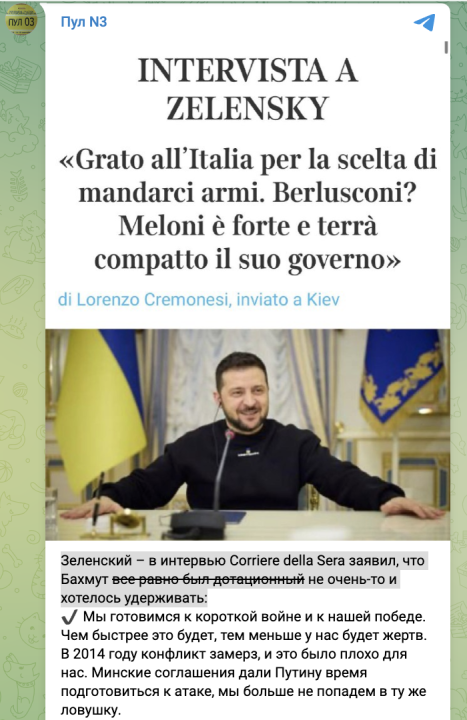
Another notable example appeared in an April 9 article published by Svobodnaya Pressa, which attributed the quote to unnamed “public opinion leaders.” This version of the quote described Bakhmut as a “useless subsidized small town of waiting traitors who keep [pro-Russia] St. George ribbons under the floorboards.”

The suspicious quote often appeared with a caption which stated, “Bakhmut also was an unhappy and pale place.” The caption references a remark made by Prime Minister Pashinyan in 2021 discussing the loss of the Nagorno-Karabakh city of Shushi, known in Azerbaijani as Shusha. Pashinyan described the city as “unhappy and pale” and concluded that conditions in the city had deteriorated. The statement sparked outrage as the city was symbolically important to Armenians, not unlike how Bakhmut is to Ukrainians.
The first comparison made between Bakhmut and Pashinyan’s “unhappy and pale” quote occurred in March 2023 on the opposition television station 5 TV Channel, which is affiliated with Robert Kocharyan, a pro-Russian former president of Armenia who is also a friend of Russian President Vladimir Putin. The March 6 story was titled, “Bakhmut will be declared ‘pale and unhappy’ – UAVs circle, non-stop, explosions in Ukraine.” In the comment section, comparisons to Pashinyan were prominent, with some commenters referring to Zelenskyy as “Nikol Number 2” – in other words, a second copy of Prime Minister Pashinyan.
An article by the popular Armenian website Hraparak.am referenced the purported Zelenskyy quote and suggested that Zelenskyy and Pashinyan are biologically related. Russian Telegram channels also drew parallels between Armenia and Ukraine, with some channels threatening Armenia with a future similar to Ukraine. On June 2, the channel Zloy Zhurnalist (“Angry Journalist”), with more than 158,000 subscribers, reacted to Pashinyan’s statement distancing Armenia from Russia by stating, “Armenians, look at the future – you are approximately where the khokhly were in 2012.” (Khokhly is a derogatory Russian term for Ukrainians.) On May 24, the Russian channel ARMAGEDDONYCH, belonging to sanctioned Russian propagandist Yevgeniy Satanovsky, commented on Pashinyan’s announcement about potentially leaving the CSTO. Satanovsky told his 180,000+ subscribers that Armenia will become another “Turkish province“ and asked why Putin “should be more Armenian than the Armenian prime minister?” He also argued that the US, in order to implement its global agenda, bet on populist leaders such as Zelenskyy and former Georgian President Mikheil Saakashvili. The post received nearly 4,000 likes.
Sargis Ter-Yesayan, another pro-Russia government critic and the president of the NGO Rule of Law and Values, also posted the purported Zelenskyy quote. He captioned it, “Bakhmut was a pale and unhappy city. Don’t you see the resemblance?… This is the result of bringing drug addicts to power.”
Ter-Yesayan published several other anti-Zelenskyy narratives on Facebook. On June 4, he posted a cartoon featuring US President Joe Biden telling Zelenskyy, “You will pay after the counteroffensive“ as Zelenskyy examines a check that reads, “Check for Russophobia.” The cartoon’s captions reads, “US finance ministry announced that Ukraine has to return the funds sent to Ukraine after the war is over.” The cartoon appeared earlier that day on the Russian language Telegram channel Iranian Journalist’s Diary.
“They will want it back with interest,” Ter-Yesayan wrote. “Misguided Ukrainians, it is not enough; you gave hundreds of thousands of victims, and now you will work all your lives to pay off the debts of billions of dollars and restore your cities.”
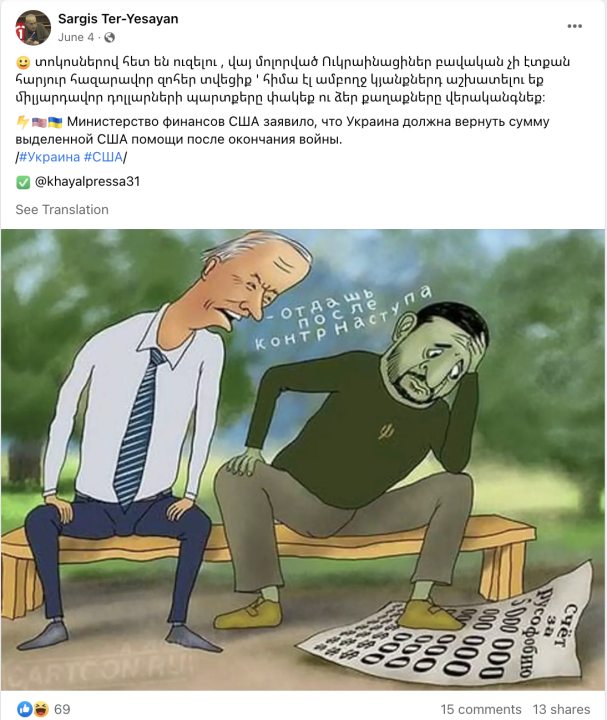
In another post, Ter-Yesayan claimed Zelenskyy said that Ukraine’s “hopes to join NATO are becoming more and more distant.” Ter-Yesayan, however, had misunderstood or, perhaps, manipulated an earlier quote from Zelenskyy in which he commented on the aspirations of other countries, not Ukraine, to join NATO and the EU. Specifically, at the June 1 European Political Community Summit, Zelenskyy said, “If even Ukrainians, who are proving our commitment to freedom and the values of a united Europe with blood, have not yet heard a clear positive answer about joining the EU and NATO, the hopes of others are becoming completely elusive.” (Emphasis added.)
Accompanying the quote, Ter-Yesayan’s post also contained cropped photo taken from a Zelenskyy video address on April 3, his face modified with what appears to be a “sad face” filter.
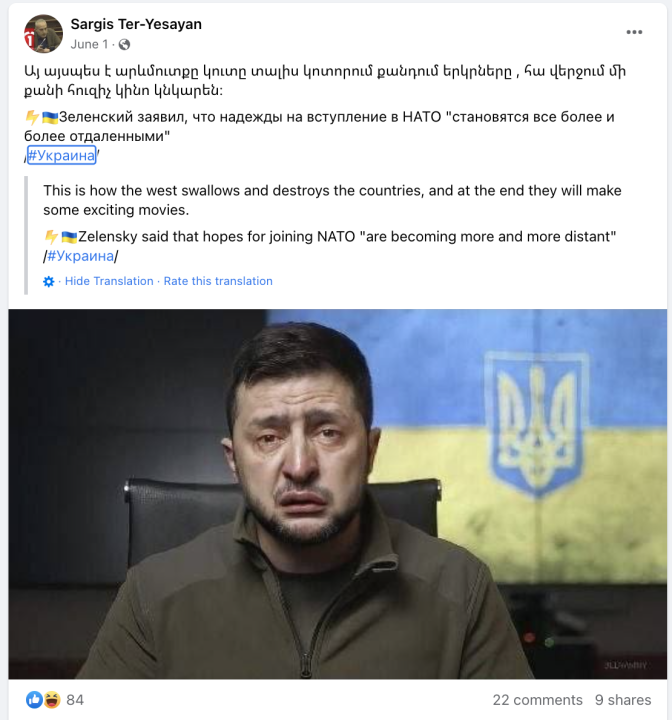
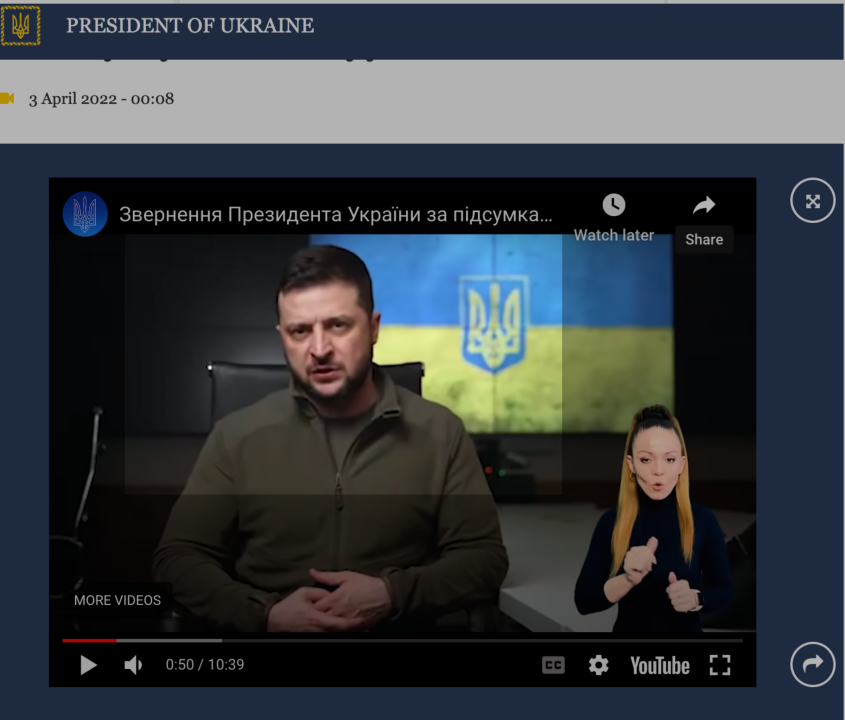
The employment of manipulated quotes and misleading narratives continues to foster anti-Ukrainian sentiment in Armenia. As Armenia distances itself from Russia, these attempts to discredit Zelenskyy in the Armenian information space are on the rise, as exemplified by efforts to frame Bakhmut as “subsidy dependent” and “pale and unhappy.” Collectively, they reinforce the broader pro-Russian narrative alleging that both Zelenskyy and Pashinyan are mere figureheads appointed by the West.
By Ani Mejlumyan, Roman Osadchuk, for DFRLab


